Further reading
- Seven Years of Highly Defective People by Scott Adams, Andrews McMeel Publishing (1997) ISBN 0-8362-3668-8.
- New York Times Business Best Sellers
It is proposed that this article be deleted because of the following concern:
If you can address this concern by improving, copyediting, sourcing, renaming, or merging the page, please edit this page and do so. You may remove this message if you improve the article or otherwise object to deletion for any reason. Although not required, you are encouraged to explain why you object to the deletion, either in your edit summary or on the talk page. If this template is removed, do not replace it . The article may be deleted if this message remains in place for seven days, i.e., after 00:35, 3 April 2023 (UTC). Find sources: "Seven Years of Highly Defective People" – news · newspapers · books · scholar · JSTOR Nominator: Please consider notifying the author/project: {{ subst:proposed deletion notify |Seven Years of Highly Defective People|concern=This book is not notable enough for Wikipedia. Google newspapers search and Google Scholar each find a few passing mentions, but nothing more. The article itself is essentially unsourced (the NYT article is yet another passing mention).}} ~~~~ |
Seven Years of Highly Defective People, is a 1997 book by Dilbert cartoonist Scott Adams which explains the origins and evolution of many of the Dilbert characters, and Adams includes comments under each comic strip reprinted in the book. In his introduction, Adams says, "Some of the notes are fascinating insights into the world of cartooning. Other notes are interesting only for their poor grammar and spelling, thus proving that you can be a moron and still have a successful career as a cartoonist." The book went to number three on The New York Times Business Best Sellers List for paperbacks.
The title is a play on the book The 7 Habits of Highly Effective People.

A comic strip is a sequence of cartoons, arranged in interrelated panels to display brief humor or form a narrative, often serialized, with text in balloons and captions. Traditionally, throughout the 20th and into the 21st century, these have been published in newspapers and magazines, with daily horizontal strips printed in black-and-white in newspapers, while Sunday papers offered longer sequences in special color comics sections. With the advent of the internet, online comic strips began to appear as webcomics.
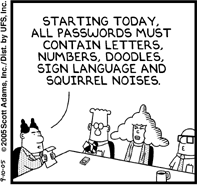
Dilbert is an American comic strip written and illustrated by Scott Adams, first published on April 16, 1989. It is known for its satirical office humor about a white-collar, micromanaged office with engineer Dilbert as the title character. It has spawned dozens of books, an animated television series, a video game, and hundreds of themed merchandise items. Dilbert Future and The Joy of Work are among the most read books in the series. In 1997, Adams received the National Cartoonists Society Reuben Award and the Newspaper Comic Strip Award for his work. Dilbert appears online and as of 2013 was published daily in 2,000 newspapers in 65 countries and 25 languages.
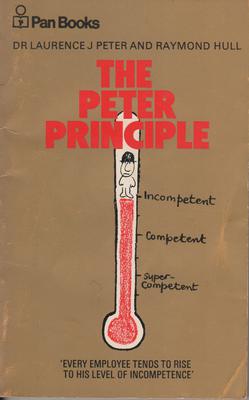
The Peter principle is a concept in management developed by Laurence J. Peter, which observes that people in a hierarchy tend to rise to "a level of respective incompetence": employees are promoted based on their success in previous jobs until they reach a level at which they are no longer competent, as skills in one job do not necessarily translate to another.

Scott Raymond Adams is an American author and cartoonist. He is the creator of the syndicated Dilbert comic strip, and the author of several nonfiction works of satire, commentary, and business. Dilbert gained national prominence during the downsizing period in 1990s America and reached a worldwide audience. Adams worked in various business roles before he became a full-time cartoonist in 1995. He writes in a satirical, often sarcastic way about the social and psychological landscape of white-collar workers in modern corporations. In addition, Adams has written books in various other areas, including the spiritual experiment God's Debris encapsulating a form of pandeism, and books on political and management topics, including Win Bigly: Persuasion in a World Where Facts Don't Matter.

The Dilberito was a vegan microwave burrito introduced in 1999 by Scott Adams Foods, Inc. and named after the comic strip character Dilbert. The product went out of production in 2003.

The Dilbert principle is a satirical concept of management developed by Scott Adams, creator of the comic strip Dilbert, which states that companies tend to promote incompetent employees to management to minimize their ability to harm productivity. The Dilbert principle is inspired by the Peter principle, which is that employees are promoted based on success until they attain their "level of incompetence" and are no longer successful. By the Dilbert principle, employees who were never competent are promoted to management to limit the damage they can do. Adams first explained the principle in a 1995 Wall Street Journal article, and elaborated upon it in his humorous 1996 book The Dilbert Principle.
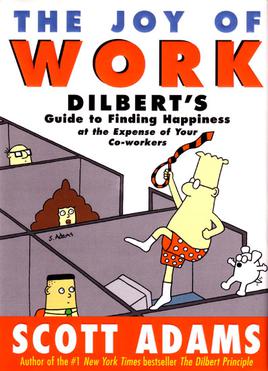
The Joy of Work (1998) by Scott Adams is a two-part book. The first part offers recommendations as to how office workers can find happiness at their cubicle desks and the second part is a formula for creating humor, based on the author's experience penning the Dilbert comic strip.

Stephan Thomas Pastis is an American cartoonist and former lawyer who is the creator of the comic strip Pearls Before Swine. He also writes children's chapter books, commencing with the release of Timmy Failure: Mistakes Were Made. The seventh book, It's the End When I Say It's the End, debuted at #4 on The New York Times Best Seller list for Children's Middle Grade Books.
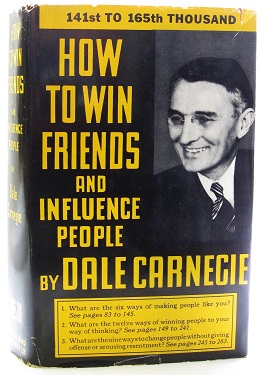
How to Win Friends and Influence People is a 1936 self-help book written by Dale Carnegie. Over 30 million copies have been sold worldwide, making it one of the best-selling books of all time.
The comic strip switcheroo was a massive practical joke in which several comic strip writers and artists (cartoonists), without the foreknowledge of their editors, traded strips for a day on April Fools' Day 1997. The Switcheroo was masterminded by comic strip creators Rick Kirkman and Jerry Scott, creators of the Baby Blues daily newspaper comic strip.
F Minus is a horizontally oriented single panel comic strip by Tony Carrillo, started when he was a sophomore at Arizona State University. It ran daily in The State Press, an independent newspaper at ASU, from 2002 until 2004, when Carrillo graduated.

Dilbert is a fictional character and the main character and protagonist of the comic strip of the same name, created by Scott Adams. The character has ideas which are typically sensible and occasionally even revolutionary, but they are rarely pursued because he is powerless. He is frustrated by the incompetence and malevolence of his co-workers and often is sarcastic and snide. He was voiced by Daniel Stern in the television show.
Asok is an Indian intern in the Dilbert comic strip. His first appearance was March 18, 1996. He is a brilliant graduate from the Indian Institute of Technology.

Dilbert is an American adult animated sitcom produced by Adelaide Productions, Idbox and United Media, and distributed by Columbia TriStar Television. The series is an adaptation of the comic strip of the same name by Scott Adams, who also served as executive producer and showrunner for the series along with former Seinfeld writer Larry Charles. The first episode was broadcast on January 25, 1999, and was UPN's highest-rated comedy series premiere at that point in the network's history; it lasted two seasons with thirty episodes and won a Primetime Emmy for its title sequence.
Robert Chesley Osborn (1904–1994) was an American satiric cartoonist, illustrator and author.
Stacy Curtis is an American cartoonist, illustrator and printmaker, who is also the inker of Richard Thompson's comic strip Cul de Sac.
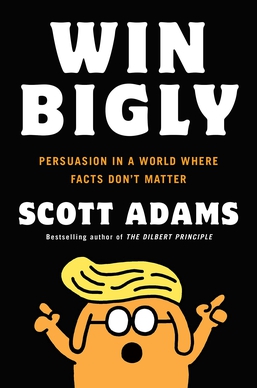
Win Bigly: Persuasion in a World Where Facts Don't Matter is a 2017 nonfiction book by Scott Adams, creator of Dilbert, and author of How To Fail At Everything and Still Win Big. The book presents Adams's theory that Donald Trump's victory in the 2016 United States presidential election was due to Trump being a "master persuader" with a deep understanding of persuasion and the human mind.

Loserthink: How Untrained Brains Are Ruining America is a 2019 nonfiction book by Scott Adams, creator of Dilbert. Adams suggests that many otherwise intelligent people are trapped by unproductive ways of thinking. The reason for this, he says, is they don't have experience across multiple domains and thus are not equipped to think more productively. Loserthink introduces readers to the most useful thought patterns in a variety of disciplines. Adams wants to help employees identify mental barriers and how to break through them, as well as escape from their own "mental prisons." Loserthink is a New York Times Bestseller.
Notable events of 2023 in comics. See also List of years in comics.